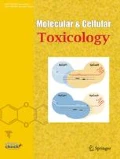Abstract
Backgrounds
Muscarinic acetylcholine receptors (mAChRs) are members of G-protein-coupled receptors. They can induce agonist-dependent neoplastic transformation and facilitate colon cancer proliferation via promoting rapid expression of a variety of early responsive genes.
Methods
In this study, we used 2-dimensional gel electrophoresis (2-DE) approach with subsequent mass spectrometry (MS) to identify up- and down-regulated proteins (a total of 23 protein spots) involved in mAChRs-related signaling pathway, energy metabolism, transcription/translation, oxidative stress metabolism and cytoskeleton organization in agonist carbachol stimulated HT-29 human colon cells.
Results
We found that the increased expression of adenocarcinoma biomarker, annexin A5 (ANXA5) induced by carbachol treatment, which was confirmed by immunoblot. This study contributes to the understanding of mechanisms underlying mAChRs agonist-induced expression of whole proteins in HT-29 colon cancer cells.
Conclusion
Our results indicated that ANXA5 might serve as a potential biomarker for the diagnosis of colon cancer.
Similar content being viewed by others
References
Schuller, H. M. Is cancer triggered by altered signalling of nicotinic acetylcholine receptors? Nat Rev Cancer 9, 195–205 (2009).
Yang, W.-L. & Frucht, H. Cholinergic receptor up-regulates COX-2 expression and prostaglandin E2 production in colon cancer cells. Carcinogenesis 21, 1789–1793 (2000).
Park, Y.-S. & Cho, N. J. EGFR and PKC are involved in the activation of ERK1/2 and p90 RSK and the subsequent proliferation of SNU-407 colon cancer cells by muscarinic acetylcholine receptors. Mol Cell Biochem 370, 191–198 (2012).
Sales, M. E. Muscarinic receptors as targets for metronomic therapy in breast cancer. Curr Pharm Des 14, 2170–2177 (2016).
Raufman, J.-P. et al. Muscarinic receptor agonists stimulate matrix metalloproteinase 1-dependent invasion of human colon cancer cells. Biochem Biophys Res Commun 415, 319–324 (2011).
Ockenga, W. et al. Epidermal growth factor receptor transactivation is required for mitogen-activated protein kinase activation by muscarinic acetylcholine receptors in HaCaT keratinocytes. Int J Mol Sci 15, 21433–21454 (2014).
Rosenvinge, E. C. & Raufman, J.-P. Muscarinic receptor signaling in colon cancer. Cancers 3, 971–981 (2011).
Ockenga, W. et al. Epidermal growth factor receptor transactivation is required for mitogen-activated protein kinase activation by muscarinic acetylcholine receptors in HaCaT keratinocytes. Int J Mol Sci 14, 21433–21454 (2014).
Liu, H. Hu, C., Wu, X. & Li, Z. Equol elicits estrogenic activities via PI3K/akt pathway in the estrogen receptor-positive MCF-7 cells. Mol Cell Toxicol 10, 285–291 (2014).
Zhou, G.-Z., Sun, G.-C. & Zhang, S.-N. Curcumin derivative HBC induces autophagy through activating AMPK signal in A549 cancer cells. Mol Cell Toxicol 11, 29–34 (2015).
Chen, J.-S. et al. Comparison of membrane fraction proteomic profiles of normal and cancerous human colorectal tissues with gel-assisted digestion and iTRAQ labeling mass spectrometry. FEBS J 277, 3028–3038 (2010).
Coghlin, C. & Murray, G. I. Biomarkers of colorectal cancer: recent advances and future challenges. Proteomics Clin Appl 9, 64–71 (2015).
Ukegawa, J.-I., Takeuchi, Y., Kusayanagi, S. & Mitamura, K. Growth-promoting effect of muscarinic acetylcholine receptors in colon cancer cells. J Cancer Res Clin Oncol 129, 272–278 (2003).
Mejías-Luque, R. et al. Changes in the invasive and metastatic capacities of HT-29/M3 cells induced by the expression of fucosyltransferase 1. Cancer Sci 98, 1000–1005 (2007).
Park, J. Meisler, A. I. & Cartwright, C. A. c-Yes tyrosine kinase activity in human colon carcinoma. Oncogene 8, 2627–2635 (1993).
Chahdi, A. & Raufman, J.-P. The Cdc42/Rac nucleotide exchange factor protein β1Pix (Pak-interacting exchange factor) modulates β-catenin transcriptional activity in colon cancer cells. Evidence for direct interaction of β 1Pix with β-catenin. J Biol Chem 288, 34019–34029 (2013).
Peng, C. W. et al. DUSP10 regulates intestinal epithelial cell growth and colorectal tumorigenesis. Oncogene 35, 206–217 (2016).
Minton, D. R. et al. Role of NADH dehydrogenase (ubiquinone) 1 alpha subcomplex 4-like 2 in clear cell renal cell carcinoma. Clin Cancer Res (2016) in press.
Nakayama, K. et al. Mutation of GDP-mannose-4,6-dehydratase in colorectal cancer metastasis. Plos ONE 8, e70298 (2013).
Kim, J.-H., Ryu, A.-R., Kang, M.-J. & Lee, M.-Y. Berberine-induced changes in protein expression and antioxidant enzymes in melanoma cells. Mol Cell Toxicol 12, 53–61 (2016).
Pyrkov, T. V. et al. Structure-based design of smallmolecule ligands of phosphofructokinase-2 activating or inhibiting glycolysis. Chem Med Chem 8, 1322–1329 (2013).
Belo, A. et al. Muscarinic receptor agonists stimulate human colon cancer cell migration and invasion. Am J Physiol Gastrointest Liver Physiol 300, G749–G760 (2011).
Fazekas, K. et al. Experimental and clinicopathologic studies on the function of the HGF receptor in human colon cancer metastasis. Clin Exp Metastasis 1, 639–649 (2000).
Cheng, K. et al. Divergent effects of muscarinic receptor subtype gene ablation on murine colon tumorigenesis reveals association of M3R and zinc finger protein 277 expression in colon neoplasia. Molecular Cancer 13, 77 (2014).
Rosenvinge, E. C. & Raufman, J.-P. Muscarinic receptor signaling in colon cancer. Cancers 3, 971–981 (2011).
Cheng, Y.-L., Zhang, G.-Y., Li, C. & Lin, J. Screening for novel protein targets of indomethacin in HCT116 human colon cancer cells using proteomics. Oncology Lett 6, 1222–1228 (2013).
Álvarez-Chaver, P. et al. Proteomics for discovery of candidate colorectal cancer biomarkers. World J Gastroenterol 20, 3804–3824 (2014).
Xue, G. et al. Expression of annexin A5 is associated with higher tumor stage and poor prognosis in colorectal adenocarcinomas. J Clin Gastroenterol 43, 831–837 (2009).
Ungethűm, L. et al. Molecular imaging of cell death in tumors. Increasing annexin A5 size reduces contribution of phosphatidylserine-targeting function to tumor uptake. Plos ONE 9, e96749 (2014).
Author information
Authors and Affiliations
Corresponding authors
Rights and permissions
About this article
Cite this article
Lee, S.Y., Lee, AR., Ahn, JY. et al. Proteomic analysis of muscarinic acetylcholine receptor-mediated proliferation in HT-29 human colon cancer cells. Mol. Cell. Toxicol. 14, 155–162 (2018). https://doi.org/10.1007/s13273-018-0017-1
Received:
Accepted:
Published:
Issue Date:
DOI: https://doi.org/10.1007/s13273-018-0017-1




